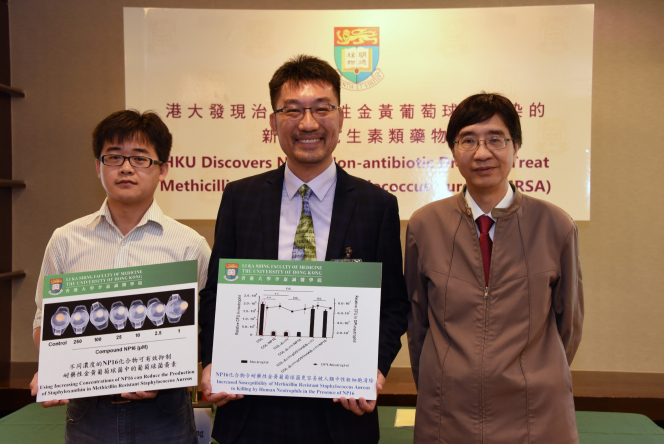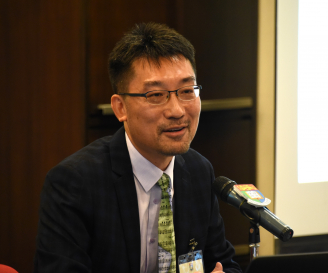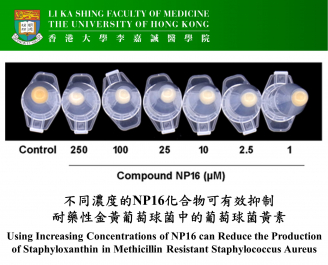Media
HKU Discovers Novel Non-antibiotic Drugs to Treat
Methicillin Resistant Staphylococcus Aureus (MRSA) Infections
07 Sep 2017

(From left) Dr Gao Peng, Post-doctoral Fellow, Dr Richard Kao Yi-tsun, Associate Professor, and Professor Yuen Kwok-yung, Henry Fok Professor in Infectious Diseases, Chair Professor of Infectious Diseases, Department of Microbiology, Li Ka Shing Faculty of Medicine, HKU took a group photo at the press conference.
The indiscriminately use of antibiotics has led to the rapid emergence of multidrug resistant (MDR) bacteria including methicillin resistant Staphylococcus aureus (MRSA). Treatment by killing bacteria using antibiotics seems not to be an effective and sustainable way of controlling infections. Researchers around the world have been searching for alternative strategies for treating bacterial infections without incubating the emergence of drug resistant bacteria. With a groundbreaking concept and by applying cutting-edge technology, the research team of The University of Hong Kong (HKU) recently discovered novel non-antibiotic drugs to treat MRSA infections.
An explorative research project proposed by Professor Yuen Kwok-yung, Henry Fok Professor in Infectious Diseases, Chair Professor of Infectious Diseases, Department of Microbiology, Li Ka Shing Faculty of Medicine, HKU, looking for new strategies to combat antimicrobial resistance was initiated in 2009. The project was led by Dr Richard Kao Yi-tsun, Associate Professor of Department of Microbiology, Li Ka Shing Faculty of Medicine, HKU. This is the world’s first study to apply chemical genetics to tackle MRSA infection. This revolutionary concept and discovery has been highly praised in the 4th International Conference on Prevention & Infection Control (ICPIC 2017) in Geneva, Switzerland at which the Hong Kong team has won the 1st Prize of the Innovation Academy Award. The findings were recently published in mBio, the top international scientific journal in the field of Microbiology, in September 2017.
Methicillin resistant Staphylococcus aureus (MRSA)
MRSA is a strain of Staphylococcus aureus (S. aureus) that is resistant to antibiotics including methicillin and other commonly used antibiotics such as oxacillin, penicillin, amoxicillin and cephalosporins. Improper use of antibiotics is widely recognised as a contributing factor to antibiotic resistance. MRSA usually causes skin and soft tissue infections such as pimples, boils, abscesses or wound infections. The infected area may be red, swollen and painful or it may produce pus. Sometimes, more serious sequelae such as bloodstream infections, lung infections or necrotising fasciitis may occur.
Research methodology
More than 50,000 structurally diverse small molecule compounds were screened by the HKU research team to identify compounds reducing the virulence of MRSA. A compound named NP16 by HKU was discovered to show strong inhibition on the production of staphyloxanthin, the golden-colored pigment in S. aureus, which has been known for its ability to promote bacterial invasion and contribute to the resistance to reactive oxygen species (ROS) and host neutrophil-based killing. Using mutational studies and enzymatic assays coupled with Liquid chromatography–mass spectrometry (LC/MS), the research team was able to identify dehydrosqualene desaturase (CrtN) as the molecular target of NP16. The efficacy of NP16 in reducing MRSA virulence was further validated in in vitro cell-based tests and in in vivo animal studies.
Research findings and significance
ROS are employed by human phagocytic cells to eliminate bacteria and various invading pathogens. The staphyloxanthin expressed by S. aureus has a major protective function against these host defensive molecules. The research team has shown that the crtN deletion mutant, which exhibited interrupted staphyloxanthin synthesis, was more sensitive to killing by purified human neutrophils and reduced virulence in mice MRSA infection models. This confirmed the importance of CrtN in in vivo survival of S. aureus.
The research team found that the novel inhibitor NP16 of S. aureus pigment production has reduced the survival of S. aureus under oxidative stress conditions. S. aureus treated with NP16 has shown increased susceptibility to human neutrophil killing and to innate immune clearance in a mouse infection model. The study has presented a potent and effective lead compound for the development of anti-virulence drugs against S. aureus, including the multidrug resistant MRSA.
Dr Richard Kao Yi-tsun, Associate Professor of Department of Microbiology, Li Ka Shing Faculty of Medicine, HKU says, “We believe that CrtN is a novel drug target for the virulence factor-based therapy against S. aureus. Compound NP16, as a potent CrtN inhibitor without direct bactericidal properties, renders the pathogen susceptible to normal host innate immune clearance on one hand, reduces the emergence of drug resistance on the other. Our approach of employing non-antibiotic drugs to treat MRSA infections by disarming the defensive shield of invading pathogens has offered new hope and new strategies for the treatment of bacterial infections related to multidrug resistant pathogens.”
About the research team
The research project was supported by the Research Fund for the Control of Infectious Diseases (RFCID) and Health and Medical Research Fund (HMRF) under Food and Health Bureau. The research team is led by Dr Richard Kao Yi-tsun, Associate Professor of Department of Microbiology, Li Ka Shing Faculty of Medicine, The University of Hong Kong. Other members include Dr Gao Peng, Post-doctoral Fellow of Department of Microbiology, Li Ka Shing Faculty of Medicine, The University of Hong Kong and Professor Julian Davies, Department of Microbiology and Immunology, The University of British Columbia, Canada.
Media enquiries
Please contact Li Ka Shing Faculty of Medicine of The University of Hong Kong by email (medkefa@hku.hk).
Please visit the website at http://www.med.hku.hk/news/ for press photos and presentation slides.
Professor Yuen Kwok-yung, Henry Fok Professor in Infectious Diseases, Chair Professor of Infectious Diseases, Department of Microbiology, Li Ka Shing Faculty of Medicine, HKU points out that the indiscriminately use of antibiotics has led to the rapid emergence of multidrug resistant bacteria including methicillin resistant Staphylococcus aureus (MRSA).
Dr Richard Kao Yi-tsun, Associate Professor of Department of Microbiology, Li Ka Shing Faculty of Medicine, HKU says that the discovery of novel non-antibiotic drugs to treat MRSA infections by the HKU research team has offered new hope and new strategies for the treatment of bacterial infections related to multidrug resistant pathogens.



